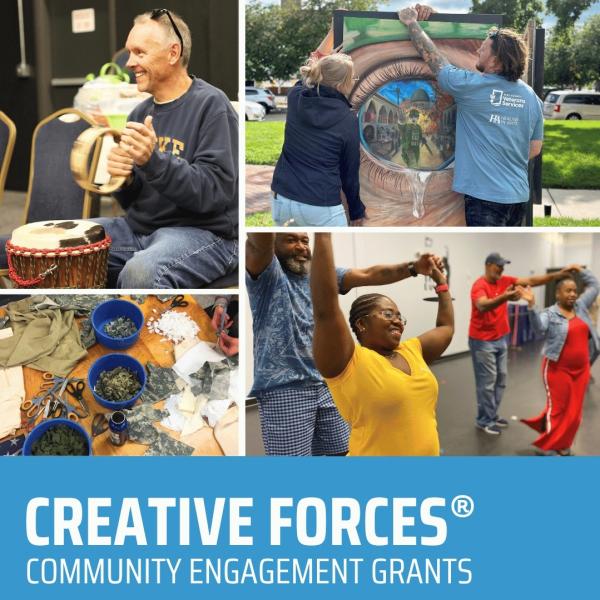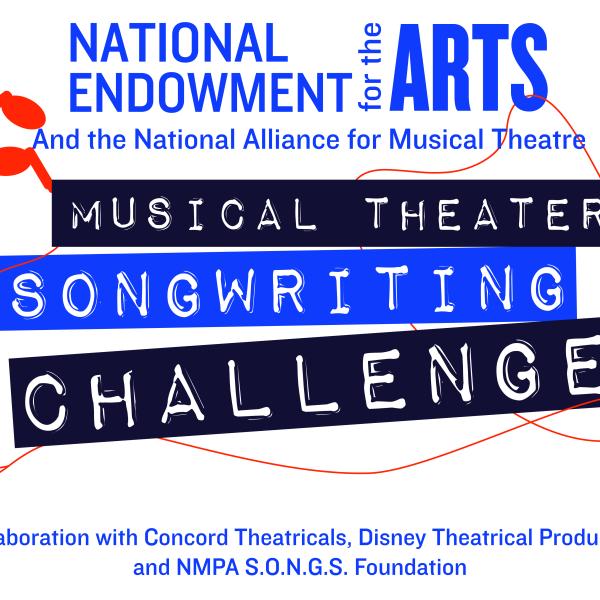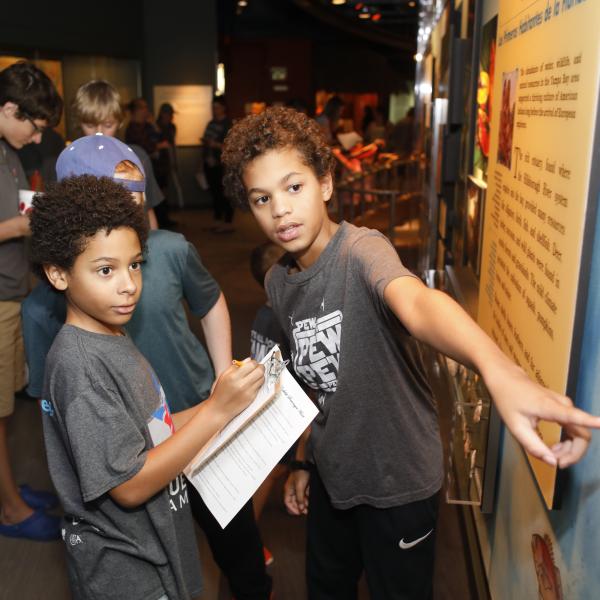Groundbreaking Arts Summit Propels National Conversation on Healing, Bridging, and Thriving
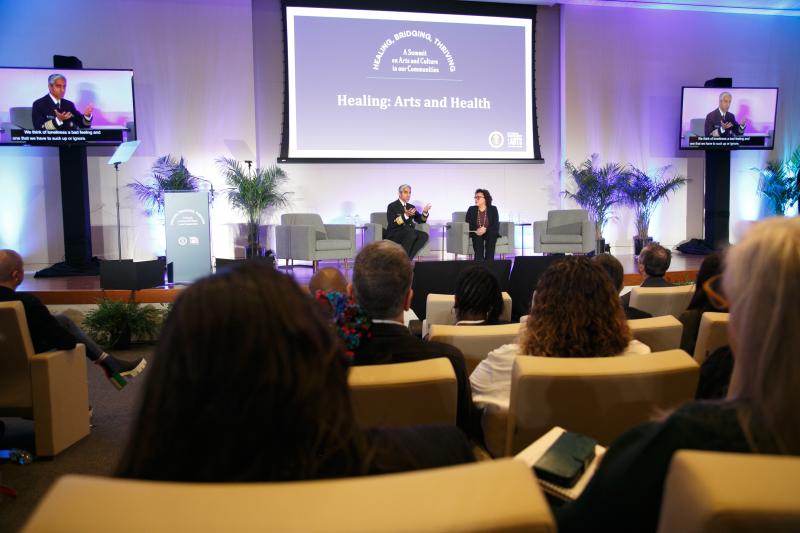
NEA Chair Maria Rosario Jackson talks with U.S. Surgeon General Vice Admiral Vivek H. Murthy during the NEA/White House Domestic Policy Council-sponsored summit, Healing, Bridging, Thriving: A Summit on Arts and Culture in Our Communities. Photo courtesy of Shutterstock for NEA
WASHINGTON, D.C. – Yesterday, the White House Domestic Policy Council and National Endowment for the Arts (NEA) co-hosted a first-of-its-kind convening to share insights and explore opportunities for arts organizations and artists to contribute to the health and well-being of individual and communities, invigorate physical spaces, fuel democracy, and foster equitable outcomes. “Healing, Bridging, Thriving: A Summit on Arts and Culture in our Communities” brought government officials, policymakers, artists, advocates, academics, and arts leaders together to examine ideas, policies, and actions that will move forward a broader understanding of how arts and culture can contribute to other fields and unlock new opportunities for artists.
As part of this event, federal leaders made several announcements related to actions they are taking to further this work. The announcements from the U.S. Department of Health and Human Services (HHS), U.S. Environmental Protection Agency (EPA), National Endowment for the Humanities (NEH), and NEA follow an executive order from President Biden calling for the integration of arts and culture to help heal the country, bridge divisions, and ensure the nation thrives.
“These new initiatives underscore how deeply the Biden-Harris Administration values the arts and understands the important role they play in a healthy and thriving society,” said Second Gentleman of the United States Douglas Emhoff. “Each project will help support our communities and strengthen our democracy. On behalf of the President, Vice President, and First Lady, I would like to thank our agency partners who have continued to champion this important work. You’re making a real difference in people’s lives – and we could not do this without you.”
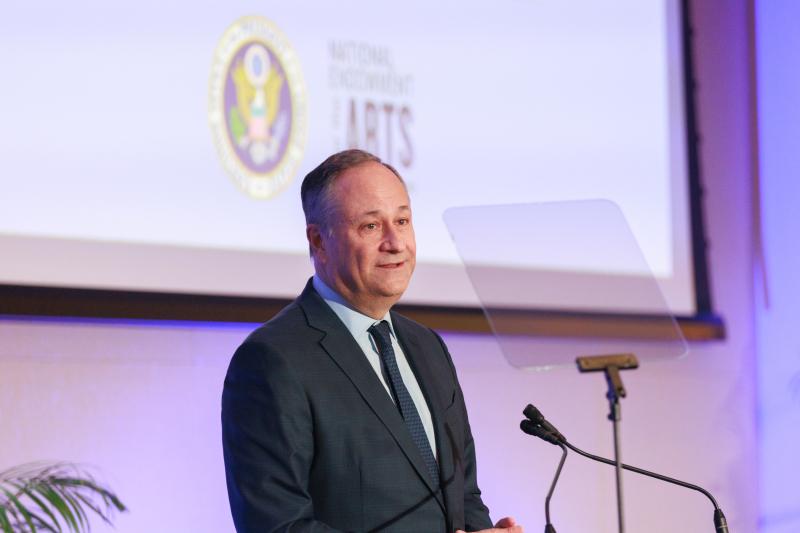
Second Gentleman of the United States Douglas Emhoff speaking at Healing, Bridging, Thriving: A Summit on Arts and Culture in Our Communities. Photo courtesy of Shutterstock for NEA
“The arts are often the best way for us to see the humanity of each other,” said Neera Tanden, domestic policy advisor to President Biden and director of the White House Domestic Policy Council. “That understanding of other people’s lives – that emotional connection that art creates to connect us to people who are entirely different from ourselves – is central to democracy. None of our work would be possible without artists, partners across the federal government, nonprofit, private, philanthropic, and other sectors represented here today.”
“For my entire career, my sincere belief has been that the things we aspire to as a nation of opportunity and justice are not possible without the integration of arts and culture throughout society,” said NEA Chair Maria Rosario Jackson, PhD. “Today’s Summit has been an extraordinary demonstration of what is possible when the arts, culture, and humanities are at the intersections of other areas of policy and practice.”
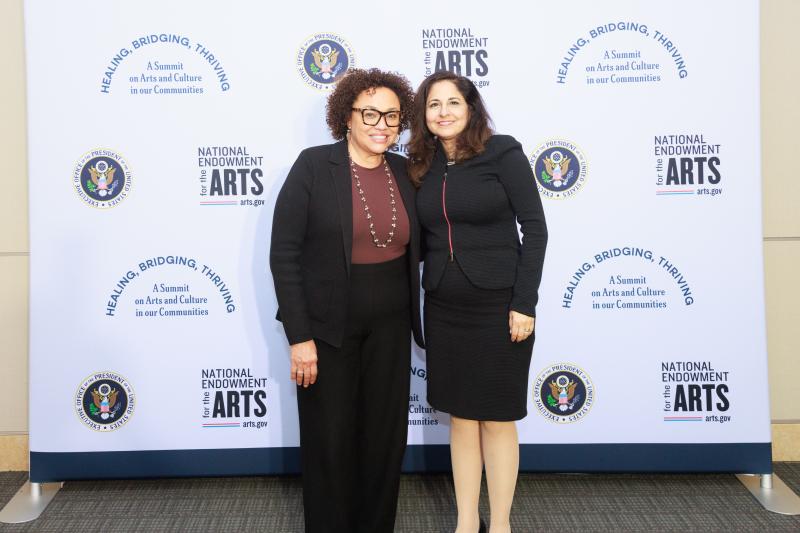
Co-hosts of Healing, Bridging, Thriving: A Summit on Arts and Culture in Our Communities: NEA Chair Maria Rosario Jackson and Domestic Policy Advisor to President Biden and Director of the White House Domestic Policy Council Neera Tanden. Photo courtesy of Shutterstock for NEA
With remarks and panels joined by the Second Gentleman of the United States Douglas Emhoff; NEA Chair Jackson and Director Tanden; U.S. Surgeon General Vivek H. Murthy; Deputy Administrator of the U.S. General Services Administration Katy Kale; Chair of the National Endowment for the Humanities Shelly C. Lowe; Assistant Administrator for the Office of Water Radhika Fox; Vice President and Artistic Director of Social Impact at the Kennedy Center Marc Bamuthi Joseph; Kennedy Center Artistic Advisor and World Health Organization Goodwill Ambassador for Arts and Health Renée Fleming; Arts and Health Lead, World Health Organization Christopher Bailey; Senior Advisor to the President and Director of the Office of Public Engagement, White House Stephen Benjamin; Chief Diversity and Equity Officer, Office of the Secretary, U.S. Department of Labor Alaysia Black Hackett; STEAM Caucus Co-Chair Rep. Suzanne Bonamici; Congressional Arts Caucus Co-Chair Rep. Chellie Pingree; artist and Mayor of Elaine, Arkansas Lisa Hicks Gilbert; Mayor Michelle Wu, City of Boston; President & Trustee, Barr Foundation Jim Canales; President, Andrew W. Mellon Foundation Dr. Elizabeth Alexander; Chief Executive & Equity Officer, Ashé Cultural Arts Center Asali DeVan Ecclesiastes; Chief Operating Officer, Atlanta Regional Commission Mike Alexander; President, Department for Professional Employees, AFL-CIO Jennifer Dorning; President and Chief Executive Officer, National Assembly of State Arts Agencies Pam Breaux; member of the National Council on the Arts Christopher Kaui Morgan of Christopher K. Morgan & Artists and Malashock Dance; multidisciplinary artist, educator, and member of the President’s Committee on the Arts and the Humanities Amanda Phingbodhipakkiya; actress, playwright, and member of the President’s Committee on the Arts and the Humanities Anna Deavere Smith; Chief Executive Officer, Cheyenne River Youth Project Julie Garreau; Co-Artistic Director of One Nation/One Project Clyde Valentin; Executive Director, Appalshop Alex Gibson; President, Minneapolis College of Art and Design Sanjit Sethi; Producer, Oscar Winner, and Co-Chair of President’s Committee on the Arts and the Humanities Bruce Cohen; Academy Award-Winning actor Troy Kotsur; and drummer Malik DOPE.
Admiral Rachel Levine, Assistant Secretary for Health, U.S. Department of Health and Human Services, and NEA Chair Jackson announced that HHS and NEA are launching a new Interagency Working Group on Arts, Health, and Civic Infrastructure, chaired by NEA Chair Jackson and HHS Secretary Becerra. This working group will enable communication and coordination across more than ten federal agencies to further partnerships, research, and increased opportunities for the inclusion of arts and cultural strategies for advancing health and strengthening civic infrastructure. This group will convene for the first time in February.
Building on the opportunities presented through this working group as well as long-standing work exploring the intersection of arts and health, NEA Chair Jackson announced the agency is committing $5 million for an initiative to support the work of artists and arts organizations in contributing to the health and well-being of individuals and communities. Primary components of the initiative include funding for related projects, a community of practice, along with research and documentation.
Radhika Fox, Assistant Administrator, Office of Water, at the U.S. Environmental Protection Agency (EPA) announced EPA is launching its first ever artist-in-residence program, in partnership with the NEA. EPA anticipates embedding a minimum of six artists within national estuary or urban water locations over 18 months; with the goal of integrating arts and culture into key EPA program areas, deepening local relationships and trust, increasing community buy-in and support, and elevating the voices of underrepresented people.
As part of the NEA and National Endowment for the Humanities’ (NEH) partnership on United We Stand: Connecting through Culture, NEH Chair Shelly C. Lowe (Navajo) discussed the impact of NEH’s $3 million in funding to all 56 state and jurisdictions to support projects seek to combat hate and promote civic engagement, social cohesion, and cross-cultural understanding. Building on this work, NEA Chair Jackson announced the NEA is committing an additional $2 million to ensure that arts organizations join their humanities colleagues in this united effort to counter hate. In 2024, NEH and NEA will host convenings focusing on the instrumental role of the arts and the humanities in deterring and responding to hate-motivated violence.
“Healing, Bridging, Thriving: A Summit on Arts and Culture in our Communities” has been made possible through a partnership with the Barr Foundation, as well as the generous support of Good Chaos, The Heinz Endowments, the William and Flora Hewlett Foundation, The Joyce Foundation, The Kresge Foundation, the McKnight Foundation, the Mellon Foundation, and The Roundhouse Foundation.
About the National Endowment for the Arts
Established by Congress in 1965, the National Endowment for the Arts (NEA) is an independent federal agency that is the largest funder of the arts and arts education in communities nationwide and a catalyst of public and private support for the arts. By advancing equitable opportunities for arts participation and practice, the NEA fosters and sustains an environment in which the arts benefit everyone in the United States.
About The White House Domestic Policy Council
The White House Domestic Policy Council (DPC) drives the development and implementation of the President’s domestic policy agenda in the White House and across the Federal government, ensuring that domestic policy decisions and programs are consistent with the President’s stated goals, and are carried out for the American people.
Contact
Liz Auclair, NEA Public Affairs, auclaire@arts.gov


